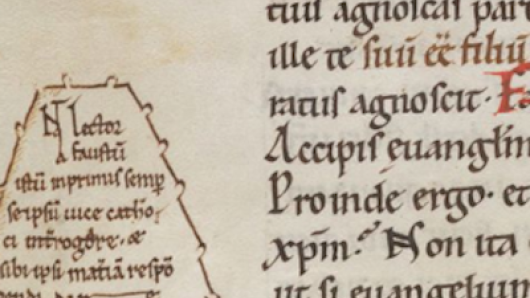Monasteries, Schools, and Notaries, Part 2: Introduction to the Transitional Gothic Script

- Introductory

Transitional Gothic, the script of 12th century monasteries and school, and the tiny variations of it used for notations and glosses.
The basic form of each letter
Standard abbreviations
Patterns of abbreviation that will allow you to approach the writing of later periods
Thousands upon thousands of manuscripts written in Latin and other languages remain from the 12th century, when Western Europe saw an unprecedented increase in manuscript production. Of these manuscripts from the middle ages, only a small percentage have been identified, much less edited and published. To explore these fascinating texts, you need to learn the art and science of reading medieval handwriting.
This seventh module of The Book: Histories Across Space and Time introduces students to medieval paleography, the science of reading old handwriting, with a focus on the era of the 12th century. By studying a representative hand in depth, you will learn to read 12th century Transitional Gothic script and decipher the abbreviations that set the pattern of writing for the following centuries before print. We will work with selected manuscripts from Harvard’s Houghton library and enter into the cultural world of the 12th century monasteries and schools. Assessments and quizzes will allow you to track your progress as you move through letter forms and abbreviations to read whole blocks of text.
[video youtube_id="LwHbfJAYqJw"]
Some knowledge of Latin is helpful for understanding the texts you will read, but students without the necessary language skills will still enjoy this chance to explore 12th century hands.
HarvardX pursues the science of learning. By registering as an online learner in an HX course, you will also participate in research about learning. Read our research statement to learn more.